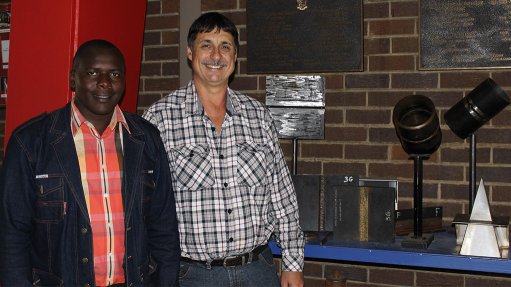
KENYAN CONNECTION Kenyan Bureau of Standards engineering workshops head Samuel Njoroge and Southern African Institute of Welding School of Practical Welding head Frans Vorster
The formation of the African Federation of Non Destructive Testing (AFNDT) and the possibility of a joint venture (JV) partnership between the Southern African Institute of Welding (SAIW) and the Kenyan Bureau of Standards (KEBS) could significantly assist in the development of welding skills in Africa, says SAIW executive director Jim Guild.
First formulated in 2002, the AFNDT, an informal, voluntary association representing countries involved in the African Regional Cooperative Agreement for Research Development and Training, which is related to Nuclear Science and Technology and International Atomic Energy Agency group NDT projects, was formalised by organisations from eight countries at a meeting held in Johannesburg, in April this year.
The eight countries forming the AFNDT signed a constitution document, which will be used to develop the organisation to become an effective regional body.
The eight founding organisations and countries of AFNDT include the Algerian Welding and Non Destructive Testing Research Centre; the Angolan National Technological Centre; Cameroonian inspection, testing and evaluation services provider Hydrocarbures Analyses Contrôles; the Ghana Atomic Energy Commission; KEBS, of Kenya; SAIW, of South Africa; the Sudan Atomic Energy Commission and the Tunisian Technical Centre of Mechanical and Electrical Industries.
The AFNDT aims to promote collaboration among African countries in matters of common interest in NDT, holding regional conferences on the technology and application of NDT methods, acting as the regional representative for Africa in international body the International Committee for Non Destructive Testing and encouraging the formation of NDT societies in countries where these do not exist.
Two new categories of membership are associate member and liaison member.
“This will allow countries to have more than just a single member organisation and encourage wider participation,” Guild explains.
Further Collaboration
Meanwhile, KEBS and SAIW, which have worked together in NDT training for several years, are now considering a wider relationship and possible JV.
Highlighting the developing relationship between the organisations, Guild points out that KEBS engineering workshops head Samuel Njoroge paid an orientation visit to the SAIW’s facility, in Johannesburg, in May, where he spent time with the SAIW team learning about training in both welding and NDT.
Kenya is expected to receive a significant boost from industrial development over the next decade, with significant construction projects, and the availability of suitably trained, qualified and certified personnel will be essential for maximum localisation of the country’s workforce.
Training and certification of welders and NDT personnel is one of the areas of special interest for Njoroge, who also spent time with Jansen and SAIW School of Practical Welding head Frans Vorster.
“This visit greatly assisted Njoroge in gaining a thorough understanding of the resources and expertise needed for these industrial development activities,” Guild concludes.